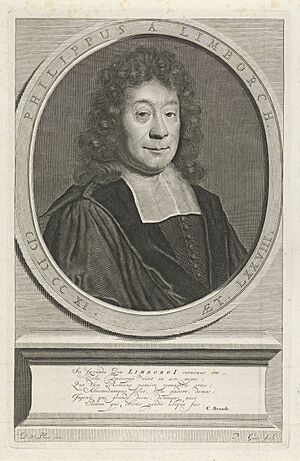Philipp van Limborch facts for kids
Quick facts for kids
Philipp van Limborch
|
|
|---|---|
 |
|
| Born | 19 June 1633 |
| Died | 30 April 1712 (aged 78) |
| Occupation | University teacher |
Philipp van Limborch (born June 19, 1633 – died April 30, 1712) was an important Dutch theologian. He was a leader in the Remonstrant movement, a group of Protestants who had different ideas about faith than some other groups at the time. He taught at a special school in Amsterdam and wrote many books.
Contents
Early Life and Education
Philipp van Limborch was born in Amsterdam, a big city in the Netherlands. His father was a lawyer. From a young age, Philipp showed a strong interest in learning.
He went to several schools to get his education. He studied in Utrecht and Leiden, which are other cities in the Netherlands. In 1652, he started studying at Utrecht University.
Becoming a Pastor and Professor
After finishing his studies, Philipp van Limborch became a pastor in 1657. He worked in a town called Gouda. A pastor is like a minister or spiritual leader for a church.
In 1667, he moved back to Amsterdam. The next year, he also became a professor. He taught theology at the Remonstrant seminary. This was a special school where people studied religion.
Friendship with John Locke
Philipp van Limborch was good friends with John Locke. John Locke was a very famous English thinker and philosopher. He wrote important ideas about how people should be free to think and believe what they want.
Locke's famous book, A Letter Concerning Toleration, was probably written for Philipp van Limborch. Limborch was also the first person to publish this important book. This shows how much they trusted each other.
His Ideas and Writings
Philipp van Limborch had his own ideas about religion. He believed in Rationalism, which means using reason and logic to understand things. He wrote many books explaining his thoughts.
His most important book was called Institutiones theologiae christianae. It was first published in 1686. This book clearly explained the ideas of other important thinkers like Simon Episcopius.
Other Important Books
Limborch wrote several other notable works:
- De veritate religionis Christianae amica collatio cum erudito Judaeo (1687): This book was a friendly discussion about the Christian faith with a Jewish scholar named Isaac Orobio de Castro.
- Historia Inquisitionis (1692): This book was about the Inquisition. The Inquisition was a historical period when some religious courts tried to find and punish people who had different beliefs. Limborch's book included old records from the Inquisition in a city called Toulouse.
- Commentarius in Acta Apostolorum et in Epistolas ad Romanos et ad Hebraeos (1711): This book was a detailed explanation of parts of the Bible, specifically the Acts of the Apostles and some letters written by Paul.
Many of his books were later translated into English. This helped his ideas spread to more people.
Editing Other Works
Besides writing his own books, Limborch also helped publish the works of other important scholars. In 1689, he edited a collection of writings by Samuel Przypkowski.
He also put together a collection of letters from famous and learned people. This collection, called Epistolae ecclesiasticae praestantum ad eruditorum virorum, was published in 1684. It included letters from people like Jacobus Arminius and Hugo Grotius. These letters are very helpful for understanding the history of the Remonstrant movement.
Limborch's careful work on old manuscripts, like the one from the Toulouse Inquisition, is still important today. He made sure these historical documents were copied accurately.
Images for kids
 | Frances Mary Albrier |
 | Whitney Young |
 | Muhammad Ali |


